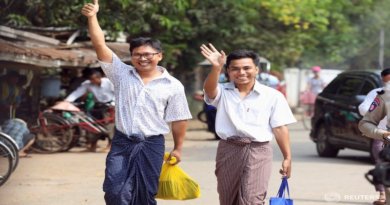Chief Guest at the First Occasion for the Giving of the Abdul Kalam Seva Ratna Awards
Chennai, Tamil Nadu, India, 9 November 2015 – When His Holiness the Dalai Lama arrived in Chennai this morning after an early flight from Delhi, the city was awash with water. Incessant heavy rains and wind throughout the weekend were yet to let up. Cars threw up spray as they traversed the waterlogged roads. The police directing traffic were clad in sodden raincoats.
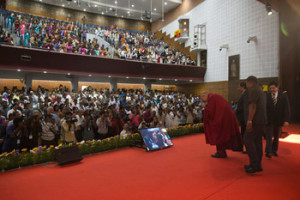
Following the sudden passing away of former President APJ Abdul Kalam in late July, the Abdul Kalam Vision India Movement in partnership with the Madras Management Association (MMA) instituted the Abdul Kalam Seva Ratna Awards. The intention was not only to recognise the outstanding contribution of individuals/organisations to tree plantation, de-addiction, reviving water bodies, providing safe drinking water and creating green campuses, villages and cities, but also to commemorate Dr Abdul Kalam. Welcoming the dignitaries and guests Mr T Shivaraman of the MMA declared that in inviting His Holiness the Dalai Lama as Chief Guest to the occasion they were requesting one great leader to honour another. Reciting a quotation from Dr Abdul Kalam:
“Where there is righteousness in the heart, there is beauty in the character. When there is beauty in the character, there is harmony in the home. When there is harmony in the home, there is order in the nation. When there is order in the nation, there is peace in the world.”
He compared it to something His Holiness has said:
“There is no need for temples; no need for complicated philosophy. Our own brain, our own heart is our temple; the philosophy is kindness.”
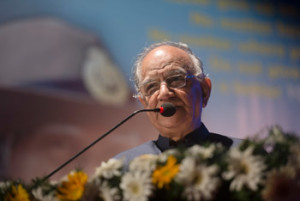
Former Election Commissioner TS Krishnamurthy mentioned that on this first occasion that the Abdul Kalam Seva Ratna Awards were being given, they were mostly going to Tamils. The plan is that in the future their scope will include the whole country. D.R. Karthikeyan, Former Special Director CBI and Former Director National Human Rights Commission, extolled the former President’s qualities: his humility, compassion and scholarship. He remarked that current President Pranab Mukherjee has declared Dr Abdul Kalam ‘the People’s President’ forever. He also mentioned that at his funeral, thousands pledged to follow his example and live as he had done.
A short video clip depicting Dr Abdul Kalam’s development and achievements as a scientist was shown, beginning with his fond recollection of the teacher whose explanation of the flight of birds first captured his imagination. V. Ponraj, who was advisor to Dr Abdul Kalam for over a decade, spoke movingly of working with him. Eminent Carnatic music vocalist, Aruna Sairam sang ‘Endaro Mahanubhavulu’ the first line of which means, ‘Salutations to all those great men who have gone before me.’ Justice KN Basha gave a stentorian speech in Tamil.
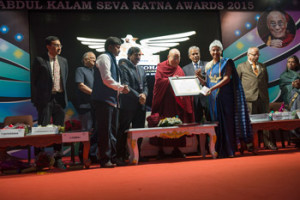
Following the actual bestowal of awards, His Holiness was invited to speak. He began in Tibetan, acknowledging that India is an ancient nation that has produced many great thinkers and philosophers.
“Although he is no longer physically among us, Dr Abdul Kalam’s spirit lives on in our admiration of him. We should all work to keep it alive. I offer my greetings and good wishes to all those who have just received awards. I remember, when I received the Nobel Peace Prize, I said I accepted it as recognition of the small contribution I may have made. But I realized that it meant I would have to keep up my defence of peace and dialogue. I request all of you too, ‘Don’t slacken your efforts, try harder to fulfil people’s hopes. Keep up the good work.’
“I first visited Chennai, Madras as it then was, in 1956 when I came to India for the celebrations of the 2500th anniversary of the Buddha, so this famous city is familiar to me. I came again in 1959 or 1960 when I remember Rajagopalachari welcomed me. This time I notice what a lot of heavy physical construction is going on. We see this happen all over the world, and yet it is at least as important that people also experience joy and peace of mind. You may have a big house, but if it is full of stress and tension, you won’t be happy living there. Physical comfort by itself doesn’t bring us peace.
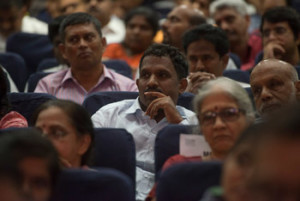
“This country has gathered a deep awareness of the function of our emotions and how our minds work. Understanding of how to tackle our destructive emotions gave rise to the concept of ahimsa and the tolerance that has allowed India to be the only country where all the world’s major religions live together in harmony. I know this occasionally breaks down, but that’s because there are mischievous people who make trouble in any society.
“In general, India presents an example to the world that different religious traditions, despite their different views, can live together in mutual respect. I often tell my Indian friends that you have an opportunity to combine the ancient understanding of the workings of the mind and emotions with contemporary scientific knowledge and development.”
His Holiness recalled that Dr Abdul Kalam was a spiritually minded man, whose background was Muslim. When he visited his residence recently a photograph reminded him of an occasion when the former President had been reading Shantideva’s ‘Guide to the Bodhisattva’s Way of Life’. He expressed a great fondness for a couple of verses and asked His Holiness to sign those pages. The verses read:
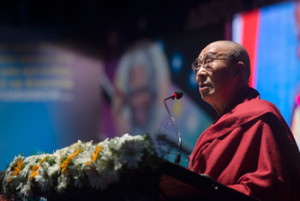
Like the earth and other great elements, And like space itself, may I remain forever, To support the lives of boundless beings, By providing all that they might need.
Just so, in all the realms of beings, As far as space itself pervades, May I be a source of all that life requires, Until beings pass beyond samsara’s pain.
His Holiness remarked that he often draws a distinction between the generation of the 20th century, to which he belongs, and whose time is gone, and the generation of the 21st century. He half-jokingly said:
“Those of us of the 20th century have created a whole host of problems, including damage to the environment, that has left a lot of work for those of you who belong to the 21st century to clear up. However, I believe that if we make an effort now, by the end of this century, but within your lifetimes, we could create a more peaceful, harmonious, compassionate world.
“We are all physically, mentally and emotionally the same. We all have the same desire to live a happy life. However, strong self-centredness drives us to see others in terms of ‘us’ and ‘them’, which leads to divisions that can even spill over into violence. The environment is telling us we live in one world. Technology is making that world smaller. Even the global economy is showing us how interdependent we are. We all belong to one human family. Secondary differences of faith, race or status are not important in the broader context that we all have the same right to achieve a happy life. As social animals we all depend on one another.
“Nowadays, many scientists are recognising the importance of our inner world. They are interested to know how we can set about reducing our destructive emotions and increase those emotions that are positive. Evidence is being found that our basic human nature is compassionate. This is a basis for hope; it lends confidence to the idea that we can build a happier world. So my advice for young people today is to think about these things, not to relax, not to give up and not to just rest content with things the way they are. We can surmount our problems and build a better world. Thank you.”
There were words of thanks to everyone who had contributed to the convening of the event and the bestowal of the awards. Finally, everyone stood for the national anthem.


